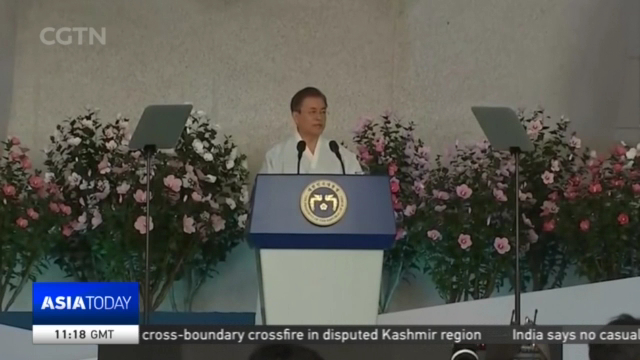
19:43, 16-Aug-2019
ROK-DPRK Relations: Pyongyang rejects unification talks with Seoul, tests more missiles
Updated
20:22, 16-Aug-2019

The Democratic People's Republic of Korea rejected the idea of future peace talks with South Korea prior to testing two more missiles Friday morning. CGTN's Jack Barton reports from Seoul.
Like most tests over the past few weeks, the DPRK's missiles flew a few hundred kilometers at a low altitude to splash down in the sea east of the peninsula.
JACK BARTON SEOUL "The sixth test in three weeks appears to be aimed not just at the ongoing wargames between South Korea and the United States, but also at a speech made this week by President Moon Jae-in."
Shortly before the launch, Pyongyang criticized Moon's speech on Thursday to mark the end of Japan's occupation in 1945 in which Moon said he hoped re-unification would happen by 2045. Pyongyang responded to the speech with a statement saying: "We have nothing more to talk about with South Korean authorities and we have no desire to sit down with them again". Seoul immediately called on Pyongyang to reconsider.
KIM EUNHAN DEPUTY SPOKESMAN, SOUTH KOREA MINISTRY OF UNIFICATION "The talks between South Korea and North Korea are the only way of implementing an inter-Korean joint declaration, and we can also deliver our opinions as much as we can at these meetings. This is our unchangeable stance and we urge North Korea to respond positively."
Next door Japan played down the latest missile launches.
SHINZO ABE JAPANESE PRIME MINISTER "It has been confirmed that they do not affect Japan's security. I will make every possible effort to protect the safety of the people in cooperation with the United States and other countries under a high-alert system."
While missile tests have now become routine Pyongyang's statement about scrapping talks with Seoul is likely to be seen as an ominous sign the long-stalled denuclearization diplomacy might have just gone into reverse. Jack Barton, CGTN, Seoul.
SITEMAP
Copyright © 2018 CGTN. Beijing ICP prepared NO.16065310-3
Copyright © 2018 CGTN. Beijing ICP prepared NO.16065310-3